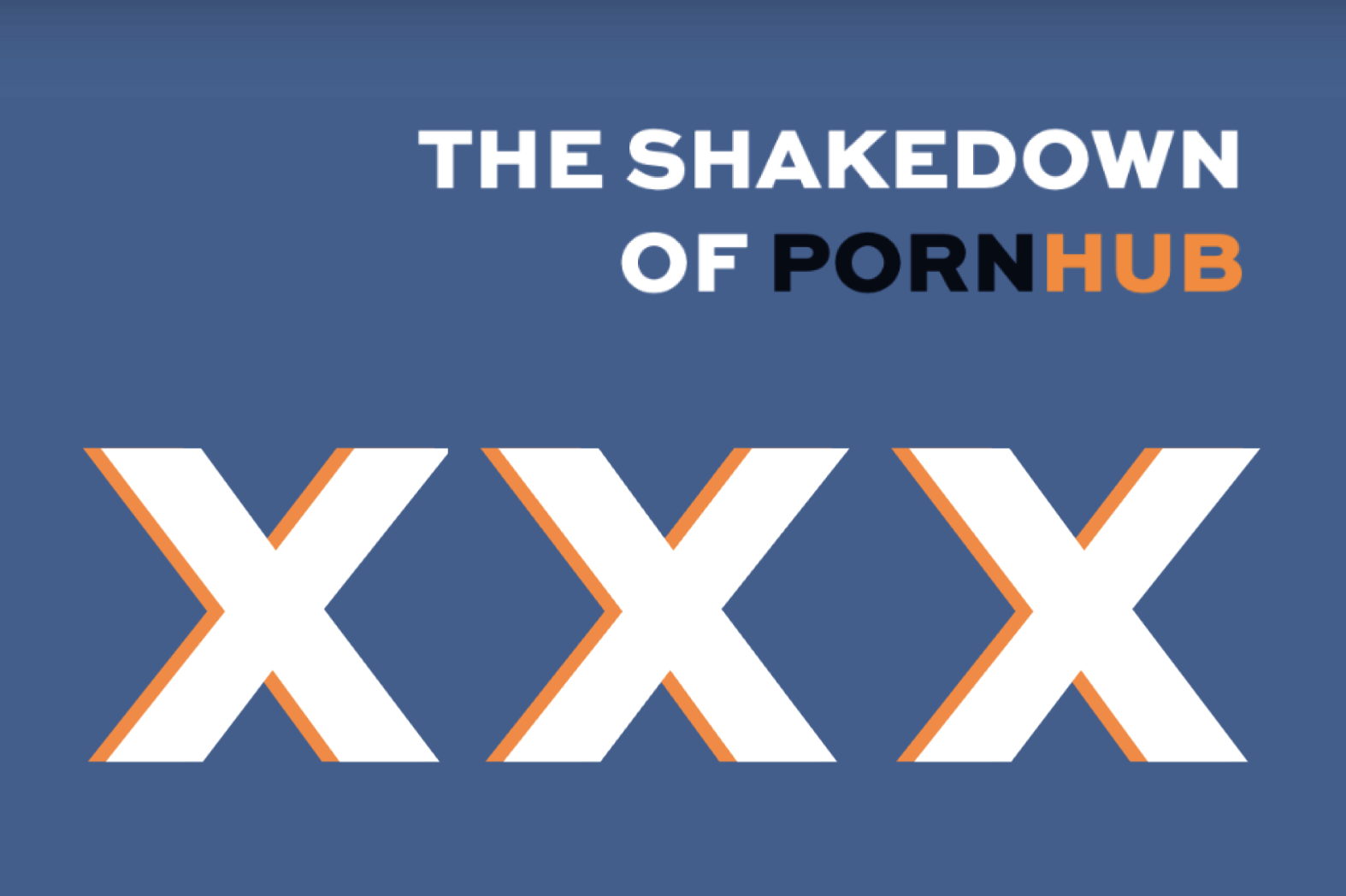
The Shakedown of Pornhub
by Liz Murphy | November 5, 2020
In writing about Shakedown, Leilah Weinraub’s 2018 documentary feature, I am at a disadvantage. It is difficult to translate into words the dreamy visuals and experimental narrative that follows the queer women who performed in the Los Angeles black-lesbian strip club from which the film gets its name. Yet what I find most striking about the documentary surpasses these formal descriptions: watching these ‘Angels’ perform is still ground-breaking today, nearly two decades after this footage was taken. To see this marginalised community represented on screen and on their own terms so unapologetically feels refreshing. Early in the film, in a short voice recording of the club, an unidentified individual pronounces: “if you straight, you don’t need to be at the front.” The tone is set for an environment that exists to serve the lesbian community first rather than to be exclusionary.
When brought to the club by a friend in 2002, Weinraub was so inspired by the performers she saw on stage that she asked Ronnie, the club’s charismatic owner, if she could work there as a photographer. After finding the photos she took flat, static, and unable to capture the exuberance of Shakedown, she switched to filming. So, over ten years, and four hundred hours of footage, Weinraub carefully chronicles those moments of spectacle –the uninhibited performances, bedazzled costumes, and endless dollar bills – through the eyes of someone for whom Shakedown was a formative home. It documents Shakedown’s heyday, before its main venue was shut down in 2004 on accounts of nude performers soliciting – around the same time that the City of Angels became a “resegregated Los Angeles”, according to Weinraub in an interview. But the extent to which this documentary feels so radical is not merely a result of the subjects it explores; much of its radicalism owes to the platform on which I viewed it: Pornhub.
In March 2020, Shakedown became the first non-pornographic film to be streamed on the Pornhub website. Though it must be said that the ‘non-pornographic’ label, whilst technically accurate, is misleading – be under no impression that this is the kind of censored, sanitised portrayal of sex workers that you would expect to find on the BBC. This unusual collaboration is in fact a continuation of a preestablished partnership between Weinraub and Pornhub. Weinraub had previously worked with the porn streaming giant through the high fashion brand Hood by Air, resulting in a joint project for its Spring/Summer 2017 show. What is so remarkable about the decision to collaborate with Pornhub is the audience the documentary can now reach. The international juggernaut, the world’s leading porn site, was visited over 42 billion times in 2019, equating to 115 million daily views. For a feature that was initially making the festival rounds and primarily being screened in museums, from a strip club known by its regular customers as “the only place like this in the hood”, this reach is unprecedented.
Using this platform to showcase the documentary’s ‘Angels’ and their underrepresented community is undoubtedly a good thing. At the same time, by streaming on a porn site, Weinraub and her feature are entering fraught debates surrounding the morality of the sex industry. These industries have historically been inextricable from feminist issues and, in the case of Pornhub, the issues of working with what many believe to be a corrupt content provider. Choosing to stream directly onto a website that provides access to pornographic videos implies a tacit approval of pornography. Collaborating with Pornhub as a distributor suggests that Weinraub is supportive of their industry and at least to some degree its operation. The same unspoken acceptance of sex work is present in Shakedown itself, where Weinraub forgoes a conventional documentary structure of problematising the subjects, in the sense of making their stories and circumstances issues for the documentarian and viewers to resolve. Instead the documentary favours a structure more akin to a textural collage – a vivid photo album that draws viewers into its world and totally immerses them in the club and its angels. It is not a didactic experience. Weinraub’s interview style eschews judgmental, pointed questions in favour of the Angels’ candidly discussing their work. The result is such that when I watch the film, I feel like a friend to the Angels, rather than a detached onlooker seeking to resolve their ‘issues’.
However, whilst the feature resists moral judgement on sex work, it is an inevitability that others will soon impart theirs. The complex relationship between feminism and pornography goes back decades, kicking into high gear in the 1970s with the legalisation of porn across most of the Western world. In response, so-called radical feminists believed shutting down the industry was essential to fighting violence against women. Susan Brownmiller, the author of Against Our Will: Men, Women and Rape, wrote in 1975 that pornography transformed women into “adult toys […] dehumanised objects to be used, abused, broken and discarded.” It was radical feminists’ firm belief that pornography perpetuated the oppression of women. And while this certainly holds truth, this charge against pornography could be made against most erotic art. Sex is rendered similarly transactional in all parts of our commercial culture. So why is pornography singled out as the sole culprit of sexist oppression in many of these debates?
The answer may be in the relatively unregulated nature of the sex industry. Like any other form of work, sex work should receive the same guaranteed levels of safety and protection; the issues for women who are sex workers intersect with issues for women more broadly. Yet on a pornography film set or in a strip club, it seems from an outsider’s perspective that the risk of sexual abuse or assault is much higher. There are many cases that testify to this fear. In 2019 the producers of GirlsDoPorn, whose videos are uploaded across several pornography websites including Pornhub, were embroiled in a trafficking case. The court found that the producers had entrapped and defrauded women into making pornography through false advertising of modelling opportunities. When these women, all of whom were very young “college-type pretty girls” as specified in the adverts, arrived for the meeting, they were forced into filming a pornographic video. Pornhub continued to host these videos even as the court ruled that these were trafficking crimes.
This is not an isolated case. Pornhub insist that they have robust procedures to stop illegal content being posted and defend the material uploaded to its site as content protected by freedom of speech. Yet only last year, a missing fifteen-year-old girl from Florida was found when over 50 videos surfaced on the platform depicting her being raped and abused (the rapist has since been identified and is now facing a felony charge). These instances have led to global protests; a petition accusing Pornhub of profiting from videos of rape and sexual abuse reached over 350,000 signatures in February 2020. The issue of exploitation remains a major issue in the current pornography industry. Yet this example of trafficking points towards a genre of porn that is of major interest to viewers: the vulnerability and degradation of women. The issue lies not so much in its commercial form as in its misogynistic content, whose spirit is reflected in the exploitative means by which it is produced. The GirlsDoPorn site marketed itself as having non-professional sex workers without safe working conditions and fair compensation, creating a situation which the women would not have chosen for themselves. The defendants were doing exactly what they told their viewers they were doing: tricking and humiliating women for men’s titillation. The same can be said for revenge porn videos or pornographic videos uploaded without consent. Producers like those from GirlsDoPorn, and by consequence distributers like Pornhub, essentially profit from the commercialisation of non-consensual content.
Shakedown, by significant contrast, is notable for its presentation of an environment where women’s sexuality is celebrated. Never does it feel like the women are partaking in an exploitative job. The cutting between club performance and candid interviews, and the deliberate inclusion of all those involved in the club – such as security workers – lends to the documentary a sense of community. I felt there was a genuine friendship that translated on screen between all the women – and Weinraub too. It was brought to the fore during the film’s climax, when an undercover police sting operation resulted in Jazmyne’s topless arrest amid her dance routine. The other Angels rush to put on her clothes as she is handcuffed by police, naked. The documentary forces the audience to reckon with the humanity of these women, and how their work feeds into their day to day lives. It becomes harder to separate the women shown in clips of performance from the clips of interviews as we get to know them better. Naturally, there is illicit footage in the documentary, but this is always on the Angels’ own terms, and there is frequent reference to their jobs as strippers as being innately connected to their exploration of their own sexuality. Egypt, one of the star performers, speaks openly about her homophobic attitudes as a high-school cheerleader and only defining herself as lesbian once she became involved as a sex worker.
The choice to stream Shakedown on its platform is likely to be a conscious rebranding opportunity for Pornhub. Dr Ann Olivarius, founder of McAllister Olivarius, a firm that specializes in non-consensual pornography, has pointed out that image-based abuse videos and coerced videos such as GirlsDoPorn are a significant part of Pornhub and other sites’ current business models. “They are massively popular with users and with site owners, and either free or incredibly cheap to produce. What, exactly, is the incentive for a site like Pornhub to remove one of their most popular products?” But the recent protests show that the backlash against pornography isn’t desisting either, so Pornhub must make a choice on what they want the future of their brand to be. The inclusion of Shakedown as part of this portfolio diversification is promising. In 1993, the queer anthropologist Gayle Rubin argued that ending sexism and misogynistic violence in commercial sexual culture could be addressed, not by getting women out of porn, but by getting them into it at an executive level. Shakedown is the first tentative step towards this new ideal.
“If your mind records a pornographic image . . . that may stay with you the rest of your life,” warned state senator Todd Weiler, calling for Utah to declare pornography a “public health emergency”. Although the statement was exaggerated, his sentiment is shared by many. The concern is that by being desensitised to these violent and degrading portrayals of women, viewers of pornography acquire a skewed sense of what sex is. For one, they may form a different image of the appropriate way to treat women; they may see female pleasure from sexual acts as subordinate to those of her male counterpart. Likewise, the conventional image of a porn star sets an unrealistic expectation for women. Mainstream porn makes women hyper-visible, and the industry goes to great lengths to make the conditions of their labour invisible. Most female porn stars have to do their own hair and makeup without reimbursement, unlike in film and television. But it is for these exact reasons that more features like Shakedown should be available on these websites. Putting women in positions of executive control in the production of pornographic material and in sex work helps dismantle these misogynistic structures that have been inscribed into the industry for decades. The porn industry is not going anywhere soon. In its current state – discriminatory, abusive, and usually exploitative – it struggles to serve any feminist purposes. Yet by spotlighting narratives that challenge sexism, racism, and exploitation in intimate settings, work like Weinraub’s is paving the way for a long overdue shift in the porn industry.
Words by Liz Murphy. Art by Jules Desai




